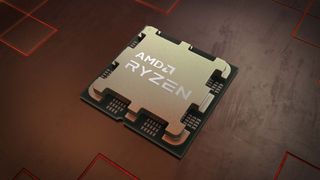AMD Ryzen 9 7950X CPU could hit an epic 5.85GHz – but you'll need a legendary cooler
Peak boost of 5.85GHz, with some serious caveats though

AMD’s Ryzen 9 7950X has been the subject of a fresh leak about the boost clock speeds which the next-gen flagship CPU is supposedly capable of reaching.
So, seasoning at the ready – and plenty of it – but the claim comes from Wccftech, whose sources reckon that while we know the 7950X is rated by AMD at a boost of (up to) 5.7GHz, the peak boost will exceed that, potentially hitting 5.85GHz as a peak (fMax) speed.
What this means is you may see speeds of 5.85GHz at stock – meaning straight out of the box, no tuning or overclocking applied – from the flagship chip, at least some of the time (with some big caveats, which we’ll dive into in a moment).
Apparently, the Ryzen 9 7950X will also have an all-core boost of 5.1GHz (some caveats apply here, which again, we’ll discuss momentarily) meaning that the CPU will be capable of attaining that speed across every one of its 16 cores, whereas the faster mentioned boosts will only apply to a single core in many scenarios. Obviously, pushing all the cores flat out is a far more demanding task than just one or two having the pedal to the metal.
Note that we have seen leaks of a 5.85GHz top speed for a pre-release 7950X in the past, so this backs up the current assertion (albeit this is all still the spinning of the rumor mill). However, AMD Ryzen processors are known to be able to top the rated boost, even at stock configurations, so it’s no surprise to see a modest bump here.
Analysis: Cooling is paramount with the Zen 4 flagship
Remember that generally, the rated boost of 5.7GHz is what you’ll get from the Zen 4 flagship CPU running at stock – AMD puts this on the box for a good reason, of course. However, that peak frequency of 5.85GHz is what you might see achieved on a single core on occasion, probably only briefly.
How often that occurs will depend on a couple of factors in the main, namely how good the processor you’ve purchased is – some run a touch faster than others, which is what’s known as the silicon lottery, with slight variances in tolerance for being pushed a bit harder – and also there’s the cooling solution to consider.
Get daily insight, inspiration and deals in your inbox
Get the hottest deals available in your inbox plus news, reviews, opinion, analysis and more from the TechRadar team.
Skeptical hat on, but Wccftech tells us that in fact those 5.85GHz highs will only be hit when the temperature of the flagship CPU is kept under 50C (in other words, when well out of any thermal danger, by the sound of things). The contention, therefore, is that most users won’t see that peak frequency, at least not straight out of the box, and likely you’ll need a seriously hefty cooler (think liquid cooling) to witness it (and even then as mentioned, this will be brief peaks).
Similarly, with the all-core boost of 5.1GHz, some 7950X chips are likely to run a little more conservatively, and maybe hit around 5GHz, perhaps just a touch under. Although variances to this degree are not going to have a huge impact on overall performance, by and large.
Don’t forget that Intel’s Raptor Lake flagship is rumored to hit 5.8GHz, so the battle between the Core i9-13900K and Ryzen 9 7950X will likely be closely fought – though naturally, performance depends on a lot more things than just raw clock speeds. What may be crucial for Intel’s side of the equation, in terms of tempting would-be buyers, is that Raptor Lake is shaping up to be a good bet for overclockers – the 13900K has been seen hitting 8GHz with exotic cooling already – whereas there are distinct questions marks over how much room enthusiasts will have to maneuver with Ryzen 7000 silicon.
Darren is a freelancer writing news and features for TechRadar (and occasionally T3) across a broad range of computing topics including CPUs, GPUs, various other hardware, VPNs, antivirus and more. He has written about tech for the best part of three decades, and writes books in his spare time (his debut novel - 'I Know What You Did Last Supper' - was published by Hachette UK in 2013).
